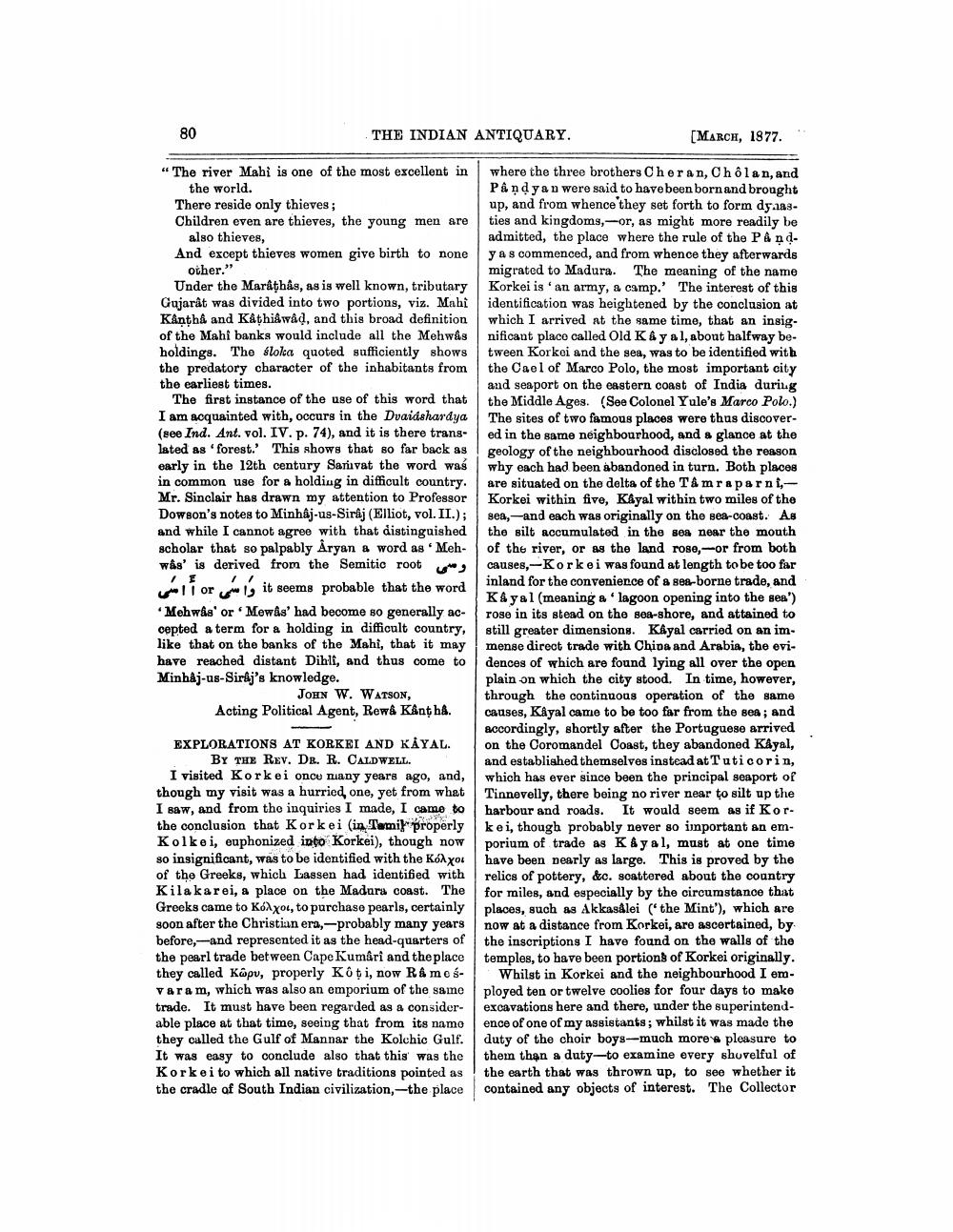________________
80
THE INDIAN ANTIQUARY.
"The river Mahi is one of the most excellent in the world.
There reside only thieves;
Children even are thieves, the young men are also thieves,
And except thieves women give birth to none other."
Under the Marâțhâs, as is well known, tributary Gujarât was divided into two portions, viz. Mahi Kantha and Kathiawâd, and this broad definition of the Mahi banks would include all the Mehwâs holdings. The sloka quoted sufficiently shows the predatory character of the inhabitants from the earliest times.
The first instance of the use of this word that I am acquainted with, occurs in the Dvaiáshardya (see Ind. Ant. vol. IV. p. 74), and it is there translated as 'forest.' This shows that so far back as early in the 12th century Samivat the word was in common use for a holding in difficult country. Mr. Sinclair has drawn my attention to Professor Dowson's notes to Minhaj-us-Sirâj (Elliot, vol. II.); and while I cannot agree with that distinguished scholar that so palpably Aryan a word as 'Meh
was' is derived from the Semitic root //
/ E
رسی it seems probable that the word را می or سی
Mehwâs' or Mewâs' had become so generally accepted a term for a holding in difficult country, like that on the banks of the Mahi, that it may have reached distant Dihli, and thus come to Minhaj-us-Siraj's knowledge.
JOHN W. WATSON, Acting Political Agent, Rewa Kânt hâ.
EXPLORATIONS AT KORKEI AND KAYAL. BY THE REV. DR. R. CALDWELL.
I visited Korkei once many years ago, and, though my visit was a hurried, one, yet from what I saw, and from the inquiries I made, I came to the conclusion that Korkei (in Tamil properly Kolkei, euphonized into Korkei), though now so insignificant, was to be identified with the Koλ you of the Greeks, which Lassen had identified with Kilakarei, a place on the Madura coast. The Greeks came to Koaxo, to purchase pearls, certainly soon after the Christian era,-probably many years before, and represented it as the head-quarters of the pearl trade between Cape Kumâri and the place they called Kopu, properly Kôti, now R& mesvaram, which was also an emporium of the same trade. It must have been regarded as a considerable place at that time, seeing that from its name they called the Gulf of Mannar the Kolchic Gulf. It was easy to conclude also that this was the Korkei to which all native traditions pointed as the cradle of South Indian civilization, the place
[MARCH, 1877.
where the three brothers Cheran, Chôlan, and Pandyan were said to have been born and brought up, and from whence they set forth to form dyaasties and kingdoms,-or, as might more readily be admitted, the place where the rule of the Pândy as commenced, and from whence they afterwards migrated to Madura. The meaning of the name Korkei is an army, a camp.' The interest of this identification was heightened by the conclusion at which I arrived at the same time, that an insignificant place called Old K & y a 1, about halfway between Korkei and the sea, was to be identified with the Cael of Marco Polo, the most important city and seaport on the eastern coast of India during the Middle Ages. (See Colonel Yule's Marco Polo.) The sites of two famous places were thus discovered in the same neighbourhood, and a glance at the geology of the neighbourhood disclosed the reason why each had been abandoned in turn. Both places are situated on the delta of the T&mraparni,Korkei within five, Kayal within two miles of the sea, and each was originally on the sea-coast. As the silt accumulated in the sea near the mouth of the river, or as the land rose,-or from both causes,-Korkei was found at length to be too far inland for the convenience of a sea-borne trade, and Kayal (meaning a lagoon opening into the sea') rose in its stead on the sea-shore, and attained to still greater dimensions. Kâyal carried on an immense direct trade with China and Arabia, the evidences of which are found lying all over the open plain on which the city stood. In time, however, through the continuous operation of the same causes, Kayal came to be too far from the sea; and accordingly, shortly after the Portuguese arrived on the Coromandel Coast, they abandoned Kâyal, and established themselves instead at Tuticorin, which has ever since been the principal seaport of Tinnevelly, there being no river near to silt up the harbour and roads. It would seem as if Korkei, though probably never so important an emporium of trade as Kayal, must at one time have been nearly as large. This is proved by the relics of pottery, &c. scattered about the country for miles, and especially by the circumstance that places, such as Akkasâlei ('the Mint"), which are now at a distance from Korkei, are ascertained, by the inscriptions I have found on the walls of the temples, to have been portions of Korkei originally.
Whilst in Korkei and the neighbourhood I employed ten or twelve coolies for four days to make excavations here and there, under the superintendence of one of my assistants; whilst it was made the duty of the choir boys-much more a pleasure to them than a duty-to examine every shovelful of the earth that was thrown up, to see whether it contained any objects of interest. The Collector




